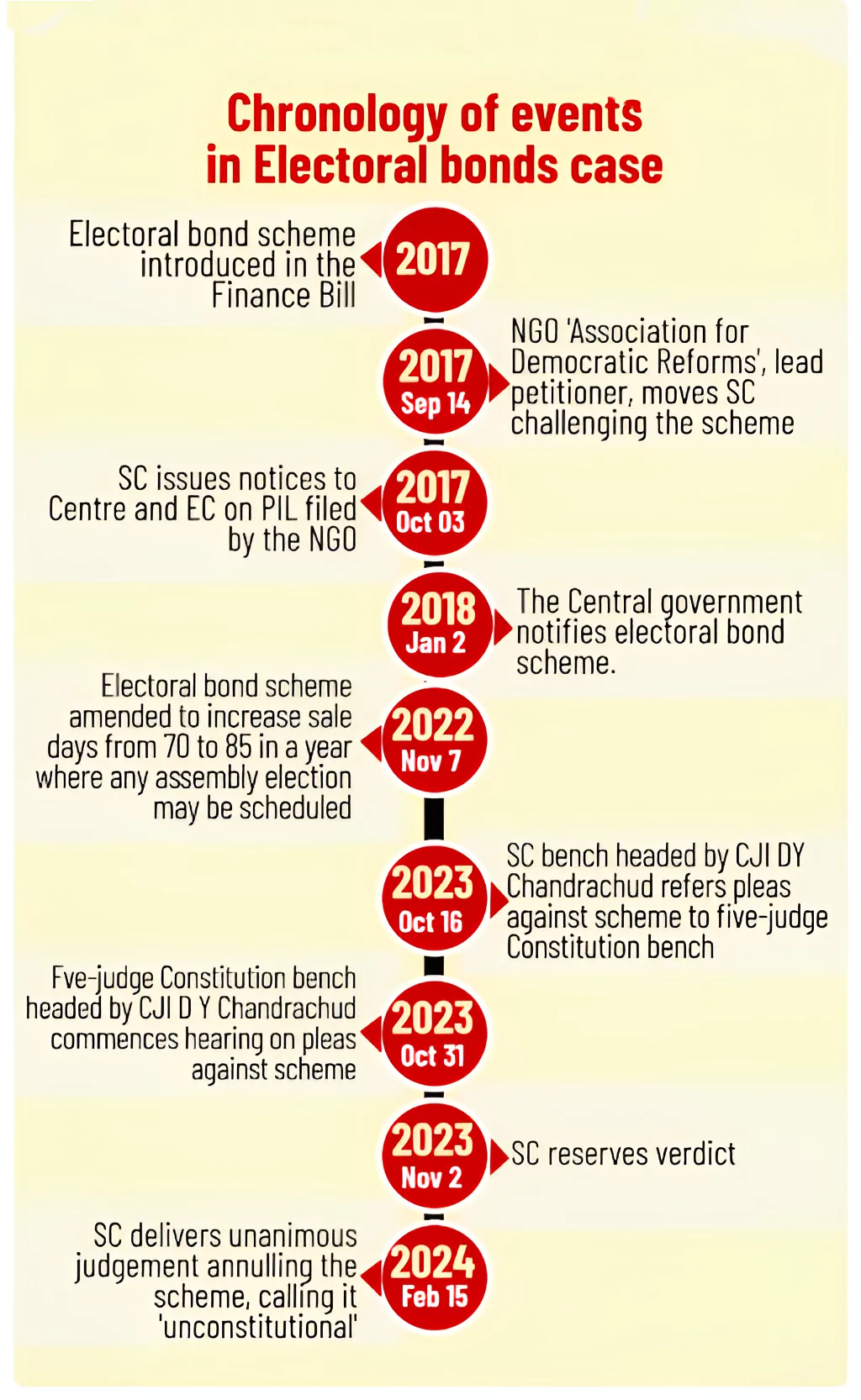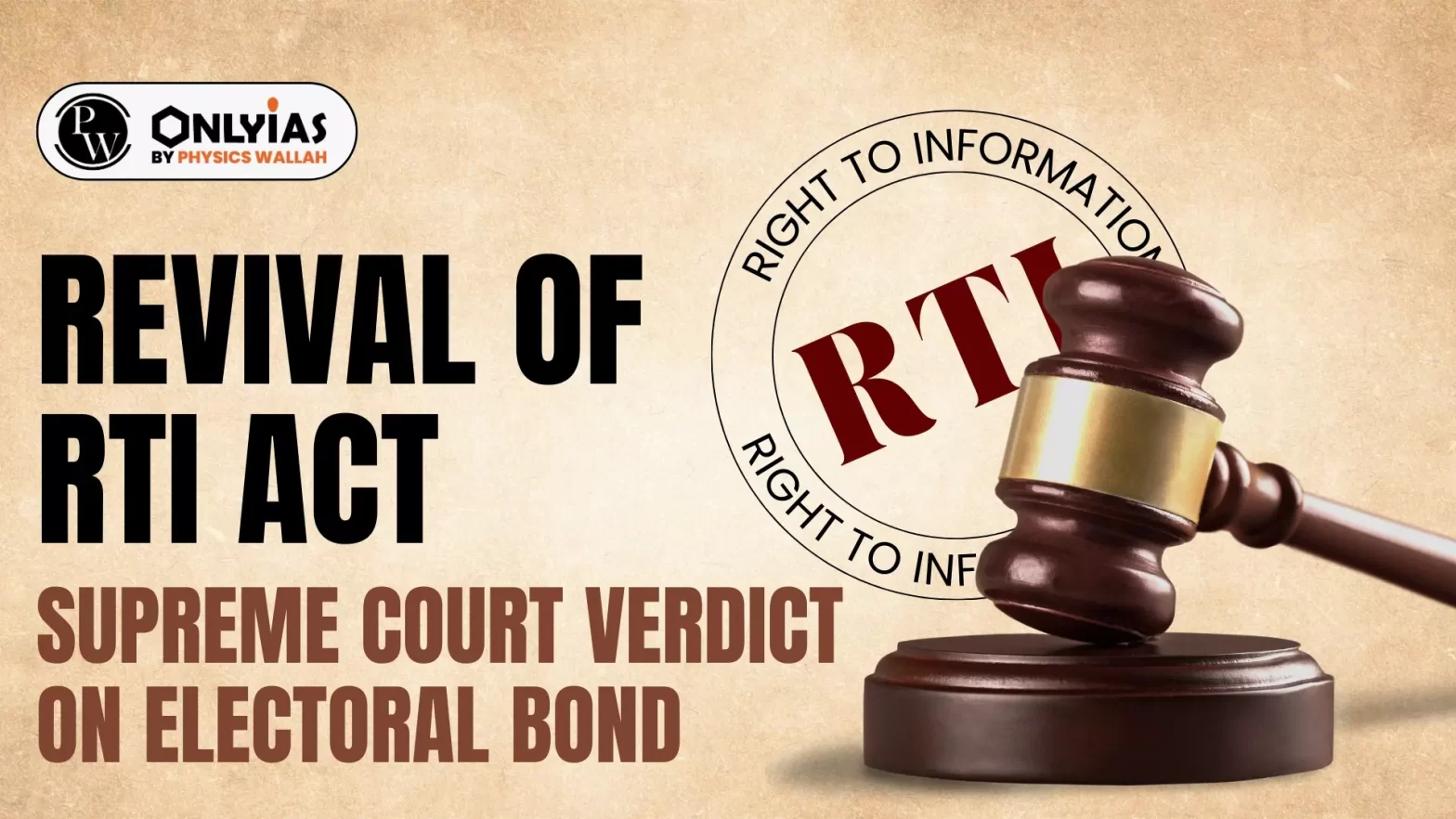Context:
This article is based on the news “SC decision on Electoral Bonds case: Will it revive the flagging RTI Act?” which was published in the Indian Express. Recently, the SC’s verdict found electoral bonds to violate fundamental rights and infringe upon the Right to Information Act.
- Association for Democratic Reforms and Anr vs Union of India Cabinet Secretary and ors: The Supreme Court declared the electoral bonds scheme violative of the right to information and free speech and expression under Article 19(1)(a) of the Constitution.
- Broad Scope of RTI: The SC averred that RTI is not confined only to state affairs but also includes information necessary for participatory democracy.
- Political parties are relevant units in the electoral process, and their funding information is essential for electoral choices.
- Emphasis on Transparency and Accountability: The principles of transparency and accountability, the fundamental objectives of the RTI Act, were considered by the judges in rendering their unanimous decision.

RTI Act: Right to Information Act 2005
Evolution of RTI Act
- Early Advocacy: The RTI era in India began with the first query filed at a Pune police station on October 12, 2005, marking the start of a new chapter in transparency.
- Mass Movement in Rajasthan: The slogan “Hamara Paisa — Hamara Hisab” by Mazdoor Kisan Sangathan Samiti (MKSS) in the 1990s in Rajasthan villages sparked a movement for access to government records, leading to the RTI Act.
- Legislative Enactment: The RTI Act was passed by the Parliament in 2005 to enable the citizens to exercise their freedom of speech and expression under Article 19(1)(a) of the Indian Constitution.
- Provision: Under the RTI Act, a citizen may request information from a “public authority” (a body of government) which is required to reply within thirty days.
Salient Features of the RTI Act
- Public Information Officer (PIO): Any citizen can apply in writing or electronically, addressing the concerned PIO.
- PIOs are officers designated by the public authorities in all administrative units or offices under it to provide information to the citizens requesting for information under the Act.
- Timely Response: Upon receiving an application, the PIO is required to respond within 30 days.
- In exceptional cases where the information concerns a third party, the response time is extended to 45 days.
- Right to Appeal: The Act recognizes the right to appeal for both the applicant and the PIO.
- If an applicant is not satisfied with the response received or does not receive a response within the stipulated time frame, they can file an appeal with the first appellate authority.
- If the applicant is still dissatisfied with the decision of the first appellate authority, they can approach the Information Commission, the final appellate authority.
- Disclosure Obligations: Public authorities must disclose information related to their organization, functions, decision-making processes, and public schemes.
- Exemptions: While promoting transparency, Section 8 of the RTI Act provides specific exemptions to defence and security-related matters, trade secrets, personal information, and cabinet proceedings.
- Provision for Exceptions under Section 8 of the RTI Act:
- The sovereignty and integrity of India
- Security, strategic, scientific or economic interests of the State
- Relations with Foreign States
- Lead to incitement of an offence
- Section 8 (2) provides exemption under Official Secrets Act, 1923.
- Whistleblower Protection: It includes provisions for whistleblower protection to encourage whistleblowing and safeguard those who expose corruption or wrongdoing.
- It prohibits the disclosure of the whistleblower’s identity and provides penalties for any harm caused to them.
- Information Commissions: It provides for the constitution of the Central Information Commission (CIC) at the centre and the State Information Commission(SIC) in the state.
- Proactive Disclosure: Section 4 of the Act calls for proactive disclosure of information by all authorities so that the public minimally resorts to using this RTI Act to obtain information.
Dents On the Foundation of RTI Act With Time
- Resistance to RTI by Political Parties: The CIC’s 2013 attempt to subject political parties to RTI scrutiny was met with defiance from both sides of the political aisle and ignoring the judgment without challenging it legally.
- This resistance not only undermined the CIC’s authority but also initiated a period of distrust between the commission and the government.
- Limited Access to Political and Historical Information: The withholding of information on the grounds of national security and foreign relations impacts public access to historical documents.
- The information about the PM Care Fund has also been kept out of RTI’s purview.
-
The RTI Amendment Act 2019
-
- Term and Appointment: The original act sets a fixed five-year term for the CIC and ICs at both national and state levels. The amendment empowered the central government to determine the term of office for the CIC and ICs, removing the fixed five-year term.
- Salary Determination: The original act stated that the salaries of the CIC and ICs were pegged to those of the Chief Election Commissioner, Election Commissioners, and state Chief Secretaries. The amendment empowers the central government to specify the salaries, allowances, and service conditions for CICs and ICs at both levels.
Functional Issues With RTI Act
- Dependence on Subordinate Rules: The RTI Act’s implementation is dependent on subordinate Rules made by the Union Government and State Governments.
- For instance, the simple matter of what payment method a public authority can accept is left to the States to decide.
- Ex – States like Tamil Nadu do not accept Indian Postal Orders (IPOs).
- Threats to RTI Activists: According to the Commonwealth Human Rights Initiative (CHRI), across India, 99 RTI activists have lost their lives,180 were assaulted and 187 were threatened since 2006.
- Dysfunctional: Due to exceptions, the Information Commissions have remained dysfunctional.
- Satark Nagrik Sangathan in its recent study of State Information Commissions’ performances found that four out of 29 are defunct and at least three are still headless.
- Vacancies in Information Commissions: In 10 commissions, the waiting time for hearing after filing an appeal is over a year.
- Nineteen of the 29 Commissions have not cared to file their annual report, mandatory under the Act.
- The CIC itself boasts of only three commissioners with eight vacant posts. At this rate, there is hardly any hope of clearing backlogs.
- The Jharkhand SIC, for instance, has had no commissioners to hear appeals since May 2020.
- Casual approach of officers in dealing with RTI queries: The PIOs frequently miss the 30-day timeline and often give incomplete information as a reply to the RTI
- Rising Pendency: The pendency of cases under the CIC has been rising. Three lakh twenty-one thousand appeals were pending before the various Commissions as of June 30, 2023.
- Judicial Bottlenecks: Several RTI cases are embroiled in judicial procedures.
- Frivolous RTIs: An oft-repeated excuse by bureaucrats for their unprofessional attitude is the number of frivolous queries or those with perverse motives. However, it is only around 4% of the total appeals, which can easily be managed.
Way Forward To RTI Act
- Revitalizing the RTI Act: Form a committee led by the Minister of Personnel to address RTI issues, aligning with the Prime Minister’s emphasis on transparency and accountability.
- Need For a Code of Conduct: A code of conduct must be evolved for the Central and State Information Commissioners to keep a strict distance from government heads and officialdom.
- Revitalizing the Defunct Commissions: The defunct state commissions should be jump started by filling vacancies in state commissions and information commissioners at the center.
- Maintaining Autonomy of the Information Commissions: It is imperative to ensure freedom of the press and democratic institutions, punish errant officials and maintain complete autonomy of the information commissions.
- Awareness & Education about the Information Laws: The Indian information law, rated as one of the strongest in the world, needs to be bolstered by raising awareness amongst the people and organizing rigorous training of government officials.
- Availability of Information in Vernacular Languages: All information associated with the RTI Act and its functioning must be made available in the local language.
Conclusion
Collaboration among the RTI activists, civil society organisations, and government agencies is essential for monitoring the implementation of the RTI Act and addressing emerging challenges.
Also Read: Farmers Protest Highlights
![]() 16 Feb 2024
16 Feb 2024

